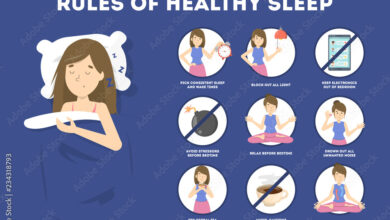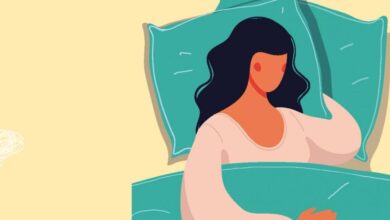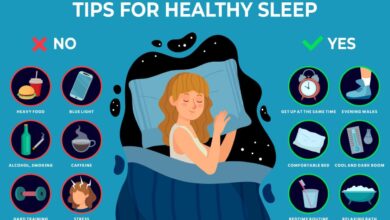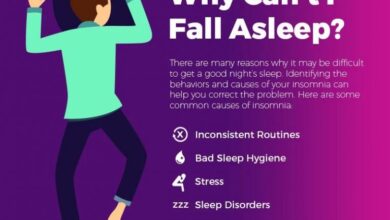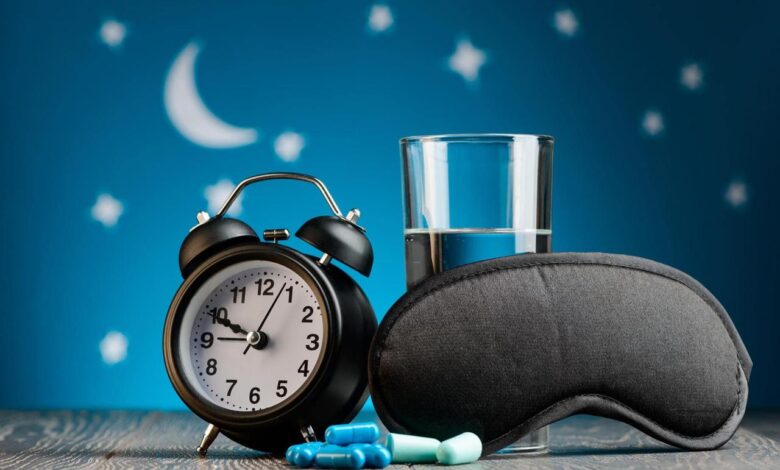
6 Realistic Sleep Hygiene Hacks for More Restful Nights
6 Realistic Sleep Hygiene Hacks for More Restful Nights takes center stage, and we’re diving into a world of proven strategies to help you conquer sleeplessness and wake up feeling refreshed. We all know the importance of a good night’s rest, but sometimes it feels like we’re constantly battling fatigue and struggling to get quality sleep.
This post is your guide to simple yet effective sleep hygiene hacks that can make a world of difference in your sleep quality.
Imagine drifting off easily, waking up feeling energized, and experiencing the transformative power of restful sleep. It’s not a dream, it’s achievable with the right approach. We’ll explore practical tips that you can easily incorporate into your routine, covering everything from establishing a consistent sleep schedule to optimizing your sleep environment and making smart choices about your pre-bedtime activities.
Establish a Consistent Sleep Schedule
Imagine your body as a finely tuned orchestra, with each instrument playing in harmony to create a beautiful symphony. Your sleep-wake cycle is like the conductor, guiding the rhythm and timing of your internal processes. Just like a conductor needs to maintain a consistent tempo for the music to flow smoothly, your body needs a consistent sleep schedule to function optimally.
The Importance of a Regular Sleep-Wake Cycle
Maintaining a regular sleep-wake cycle, even on weekends, is crucial for regulating your body’s natural sleep-wake rhythm, known as the circadian rhythm. This rhythm influences various bodily functions, including hormone production, body temperature, and alertness. A consistent sleep schedule helps synchronize your internal clock with the external environment, promoting better sleep quality and overall well-being.
Creating a Sleep Schedule that Aligns with Individual Needs
To establish a consistent sleep schedule, consider the following:
- Identify your natural sleep-wake cycle:Pay attention to your body’s natural sleepiness and wakefulness patterns. This will help you determine the ideal time to go to bed and wake up.
- Set a regular bedtime and wake-up time:Choose a bedtime and wake-up time that allows for 7-9 hours of sleep and stick to it as much as possible, even on weekends.
- Create a relaxing bedtime routine:Engage in calming activities like taking a warm bath, reading a book, or listening to soothing music to prepare your body and mind for sleep.
- Avoid screen time before bed:The blue light emitted from electronic devices can interfere with melatonin production, making it harder to fall asleep.
- Create a conducive sleep environment:Make sure your bedroom is dark, quiet, and cool. Use blackout curtains, earplugs, or a white noise machine to minimize distractions.
Optimize Your Sleep Environment
Your bedroom should be a sanctuary for sleep, a place where your body can relax and recharge. A cool, dark, and quiet sleep environment is crucial for promoting restful sleep. Think of it as setting the stage for a good night’s sleep.
Room Temperature
The ideal room temperature for sleep is between 60 and 67 degrees Fahrenheit (15.5 to 19.5 degrees Celsius). A cooler room temperature helps regulate your body temperature, making it easier to fall asleep and stay asleep. If you find yourself waking up feeling hot and sweaty, consider adjusting your thermostat or opening a window to cool down your room.
Light
Light can significantly impact your sleep-wake cycle. Exposure to light, especially blue light emitted from electronic devices, can suppress melatonin production, the hormone that regulates your sleep-wake cycle. To create a dark sleep environment, use blackout curtains or room-darkening shades to block out all light.
Avoid using electronic devices for at least an hour before bedtime, and consider using a blue light filter on your devices.
Noise
Noise can disrupt your sleep, especially if it’s loud or sudden. A quiet sleep environment is essential for promoting deep and restful sleep. Consider using earplugs to block out noise from outside your home or from other household members.
Getting a good night’s sleep is essential for overall well-being, and practicing good sleep hygiene can make a big difference. From establishing a consistent sleep schedule to creating a relaxing bedtime routine, there are many simple hacks you can implement.
And while a good night’s sleep is important, it’s also nice to treat yourself to something delicious, like one of the 11 healthy pizzas under 400 calories that I recently discovered. After all, a balanced lifestyle includes both healthy habits and occasional indulgences.
So, stick to your sleep hygiene routine and enjoy a guilt-free pizza night!
If you find yourself struggling to fall asleep in a quiet room, you might try using a white noise machine to create a calming and consistent background noise.
Limit Caffeine and Alcohol Before Bed
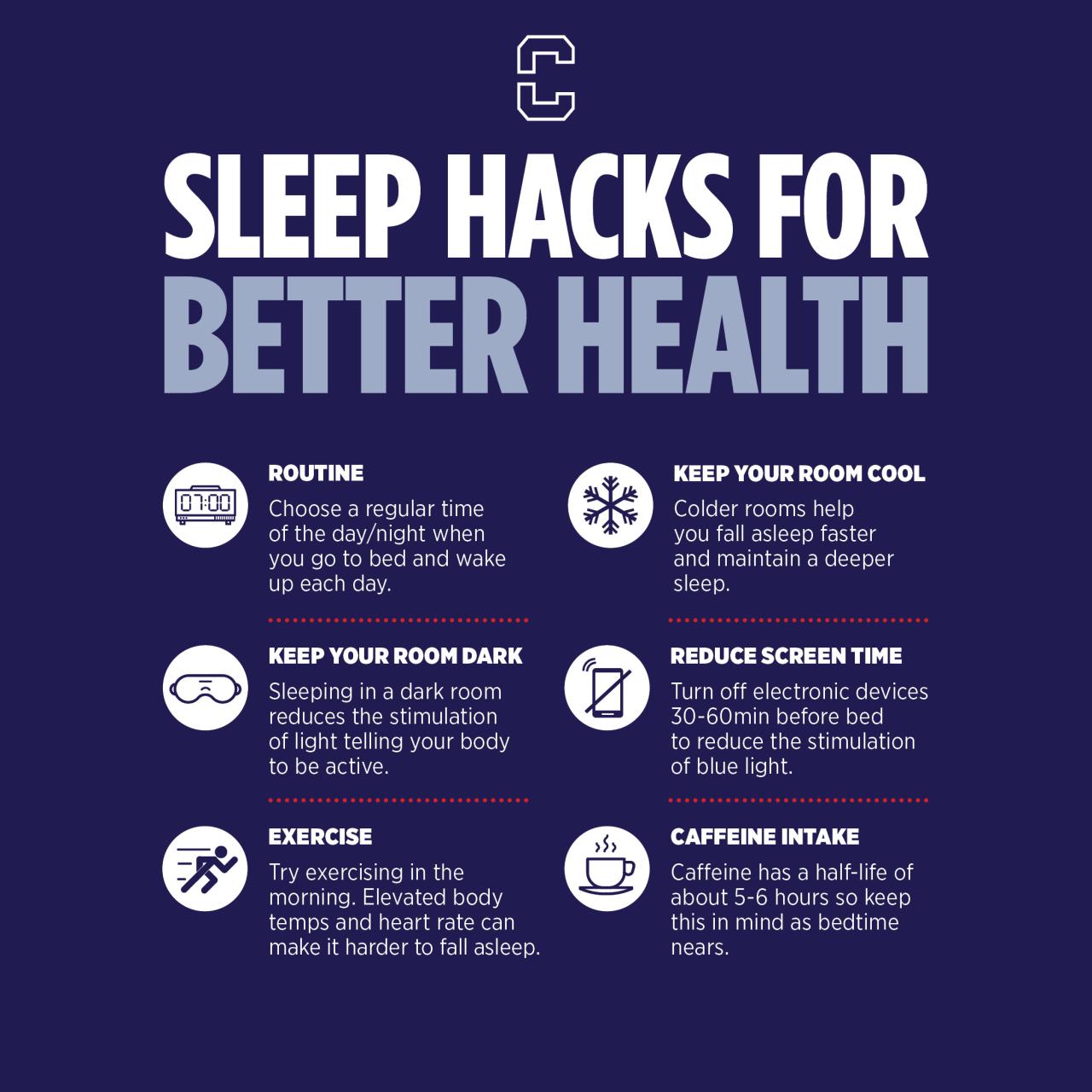
While a late-night coffee or a nightcap might seem tempting, these substances can significantly disrupt your sleep patterns. Caffeine and alcohol, although seemingly harmless, can interfere with the quality and duration of your sleep. Understanding how these substances impact your sleep can help you make informed choices for a more restful night.
Getting enough sleep is crucial for overall health and well-being, and a good night’s rest can be the foundation for a successful weight loss journey. One of the key factors in achieving restful sleep is maintaining a healthy diet, and that includes incorporating high-fiber foods into your meals.
For a comprehensive guide on how to feel full and slim with fiber-rich meals, check out this article on High Fiber Meals for Weight Loss: A Guide to Feeling Full and Slim. Once you’ve got your diet in check, you can focus on other sleep hygiene hacks like creating a relaxing bedtime routine, avoiding caffeine and alcohol before bed, and ensuring your bedroom is cool, dark, and quiet.
The Impact of Caffeine on Sleep
Caffeine is a stimulant that blocks adenosine, a neurotransmitter that promotes sleepiness. When you consume caffeine, it keeps you alert and awake. The effects of caffeine can last for several hours, making it difficult to fall asleep even if you consume it several hours before bedtime.
Getting enough sleep is crucial for overall well-being, and a good night’s rest can even help with weight management! Making small changes to your sleep routine, like sticking to a consistent sleep schedule and creating a relaxing bedtime ritual, can make a big difference.
And remember, a healthy diet and regular exercise are also essential for weight loss, so check out this article on 10 Simple Changes That Lead to Weight Loss for some helpful tips. Once you’ve got those basics down, you’ll be well on your way to a more restful night and a healthier lifestyle.
- A study published in the Journal of Clinical Sleep Medicine found that consuming caffeine six hours before bedtime significantly reduced sleep quality and increased the time it took to fall asleep.
- The effects of caffeine can vary depending on individual sensitivity, metabolism, and the amount consumed.
The Impact of Alcohol on Sleep
Although alcohol can initially make you feel drowsy and help you fall asleep faster, it disrupts sleep later in the night. Alcohol interferes with the natural sleep cycle, leading to fragmented sleep and reduced sleep quality.
- Alcohol suppresses REM sleep, which is the stage of sleep crucial for memory consolidation and emotional regulation.
- As alcohol is metabolized, it can cause you to wake up during the night, making it difficult to fall back asleep.
Recommendations for Limiting Caffeine and Alcohol Intake
To minimize the impact of caffeine and alcohol on your sleep, consider the following:
- Avoid caffeine after midday:Limit caffeine intake to the morning hours and avoid consuming it after 2 pm to allow your body enough time to process it before bedtime.
- Avoid alcohol before bed:If you choose to drink alcohol, do so several hours before bedtime to allow your body to process it before trying to sleep.
- Stay hydrated:Drinking plenty of water throughout the day can help flush out caffeine and alcohol from your system.
Create a Relaxing Bedtime Routine
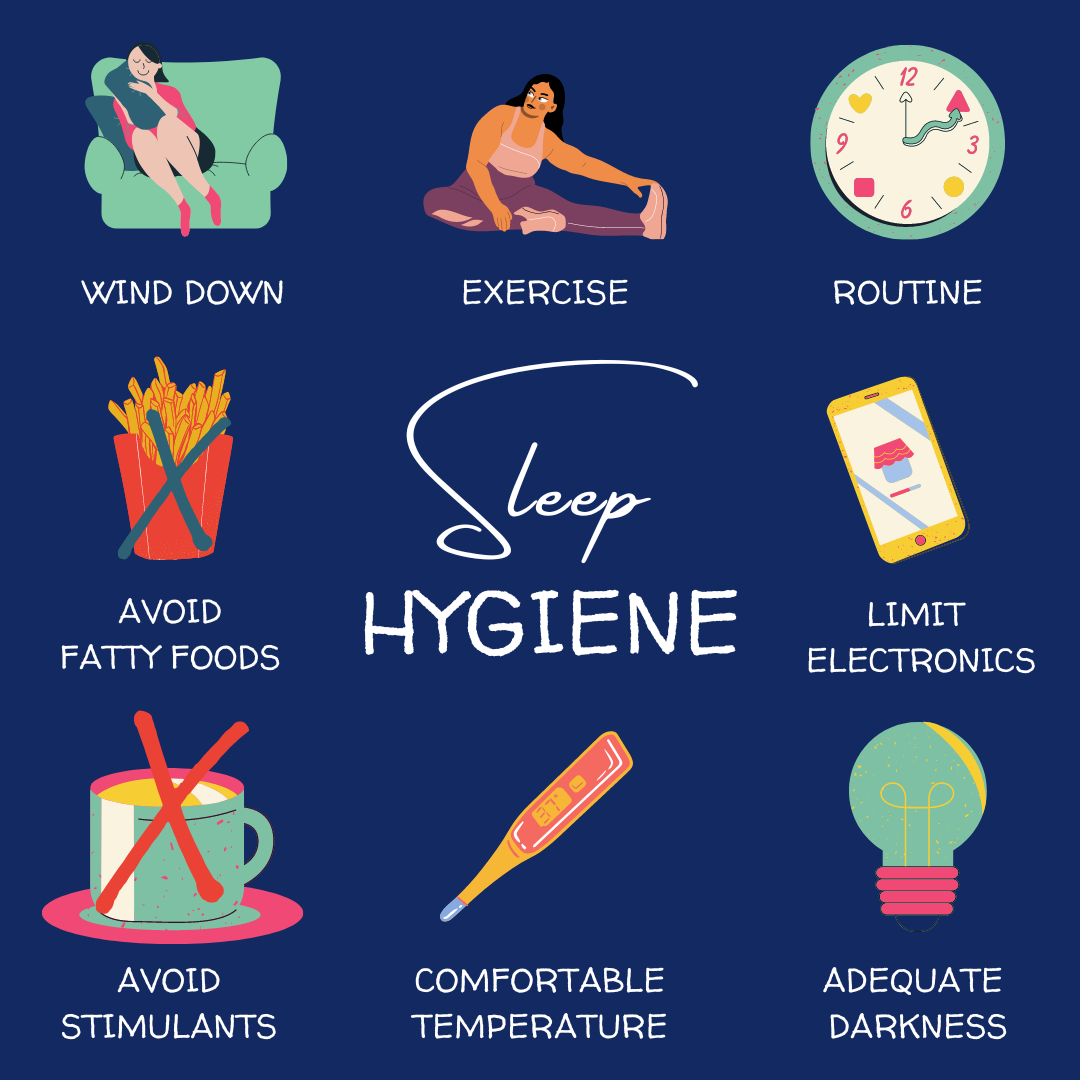
A consistent bedtime routine signals to your body that it’s time to wind down and prepare for sleep. This can help regulate your internal clock, making it easier to fall asleep and stay asleep throughout the night.
Creating a Personalized Bedtime Routine
A relaxing bedtime routine can help you transition from your day’s activities to a peaceful sleep state. It’s important to personalize this routine to your individual needs and preferences. Here are some tips for creating a personalized bedtime routine:
- Establish a Consistent Wind-Down Time:Aim to go to bed and wake up around the same time each day, even on weekends. This helps regulate your body’s natural sleep-wake cycle, promoting consistent sleep patterns.
- Dim the Lights:As evening approaches, start dimming the lights in your home. This signals to your body that it’s time to wind down. The production of melatonin, a hormone that regulates sleep, increases in darkness.
- Avoid Screen Time:The blue light emitted from electronic devices like phones, tablets, and computers can interfere with melatonin production and make it harder to fall asleep. Avoid screen time for at least an hour before bed.
- Engage in Relaxing Activities:Incorporate activities that promote relaxation into your bedtime routine. This could include taking a warm bath, reading a book, listening to calming music, or practicing gentle stretching or yoga.
- Mindful Breathing:Practice deep, slow breathing exercises for a few minutes before bed. This can help calm your mind and body, preparing you for sleep.
Examples of Relaxing Bedtime Activities
Here are some examples of activities that can help you relax before bed:
- Warm Bath:Soaking in a warm bath can help relax your muscles and ease tension. Adding Epsom salts or essential oils like lavender can enhance the calming effect.
- Reading:Reading a book can help distract your mind from the day’s worries and create a sense of peace. Choose a book that is calming and engaging, avoiding anything too stimulating.
- Soothing Music:Listening to calming music can help reduce stress and anxiety, promoting relaxation. Classical music, nature sounds, or ambient music are good options.
- Meditation or Mindfulness:Practicing mindfulness or meditation can help clear your mind and reduce racing thoughts. There are many guided meditations available online or through apps.
- Journaling:Writing down your thoughts and feelings can help release pent-up emotions and clear your mind. Focus on positive thoughts and things you are grateful for.
Get Regular Exercise: 6 Realistic Sleep Hygiene Hacks For More Restful Nights
Regular physical activity plays a crucial role in promoting good sleep. While it might seem counterintuitive, exercising can actually enhance your sleep quality and duration.
The Link Between Physical Activity and Sleep Quality
Exercise helps regulate your body’s natural sleep-wake cycle, known as the circadian rhythm. It does this by increasing your body temperature during the day, which then naturally cools down in the evening, signaling your body that it’s time to sleep.
Furthermore, exercise can reduce stress and anxiety, which are common culprits of sleep disturbances.
How Exercise Improves Sleep Duration and Quality
A regular exercise routine can improve your sleep in several ways:
- Increased Sleep Duration:Studies have shown that individuals who engage in regular exercise tend to sleep longer and experience fewer instances of waking up during the night.
- Improved Sleep Quality:Exercise helps promote deeper, more restorative sleep, characterized by longer periods of slow-wave sleep, which is essential for physical and mental recovery.
- Reduced Sleep Latency:This refers to the time it takes to fall asleep. Exercise can help you fall asleep faster, reducing the amount of time spent tossing and turning in bed.
Incorporating Regular Exercise into Your Daily Routine
- Find Activities You Enjoy:The key to making exercise a habit is to choose activities you genuinely enjoy. This could include walking, running, swimming, dancing, cycling, or any other form of physical activity that suits your preferences and fitness level.
- Start Slowly and Gradually Increase Intensity:If you’re new to exercise, start with short sessions and gradually increase the duration and intensity as your fitness improves. Aim for at least 30 minutes of moderate-intensity exercise most days of the week.
- Avoid Strenuous Activity Close to Bedtime:While exercise is beneficial for sleep, it’s best to avoid intense workouts within a few hours of bedtime. This can elevate your body temperature and make it harder to fall asleep.
Limit Screen Time Before Bed
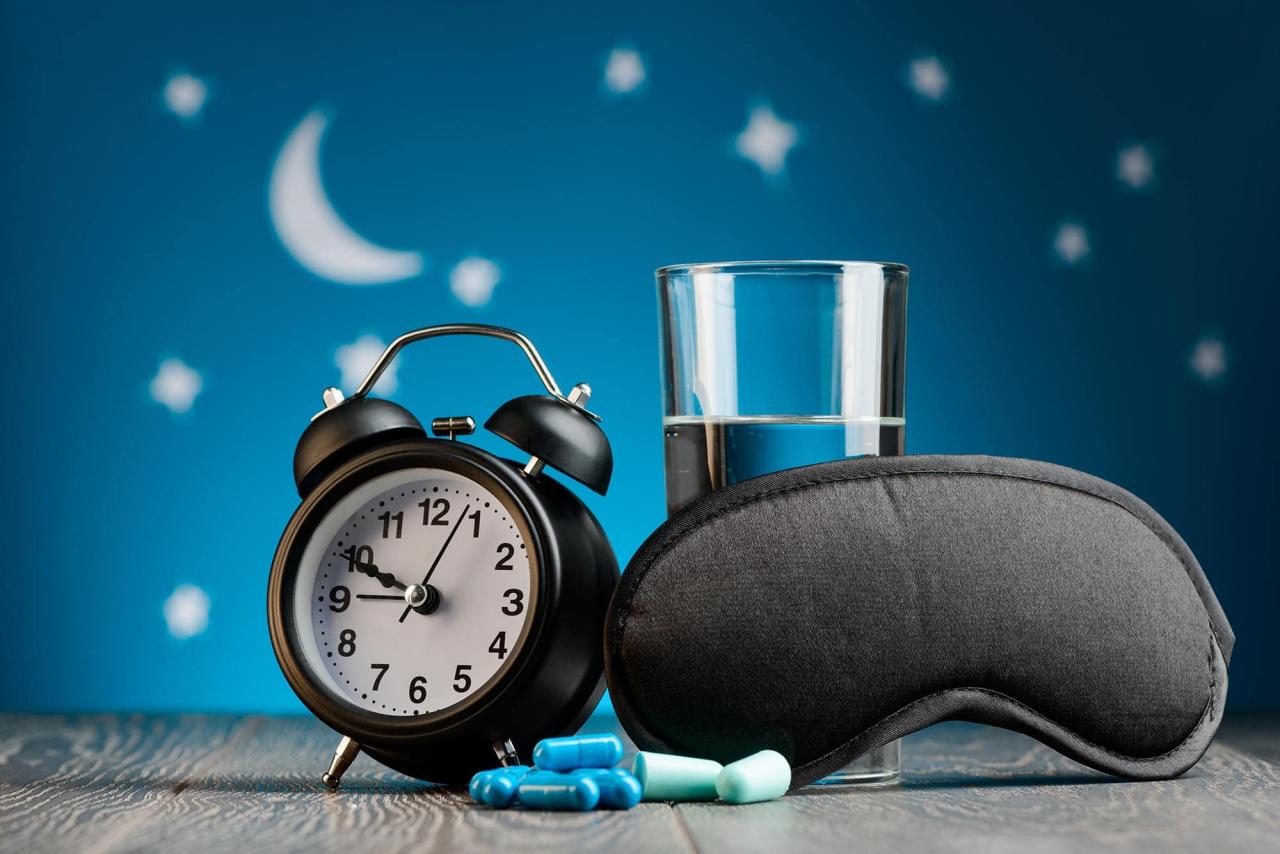
The blue light emitted from electronic devices can significantly disrupt your sleep patterns, making it harder to fall asleep and stay asleep. This is because blue light suppresses the production of melatonin, a hormone that regulates your sleep-wake cycle. By limiting screen time before bed, you can help your body naturally prepare for sleep and enjoy a more restful night.
The Impact of Blue Light on Sleep, 6 realistic sleep hygiene hacks for more restful nights
Blue light, which is emitted from electronic devices like smartphones, tablets, computers, and TVs, can disrupt your sleep cycle by suppressing the production of melatonin. Melatonin is a hormone that helps regulate your sleep-wake cycle, and its production is naturally suppressed by exposure to bright light, especially blue light.
When you use electronic devices before bed, the blue light emitted from these devices tricks your brain into thinking it’s still daytime, suppressing melatonin production and delaying the onset of sleepiness. This can lead to difficulty falling asleep, staying asleep, and waking up feeling tired and groggy.
Tips for Reducing Screen Time Before Bed
- Set a Digital Curfew:Establish a specific time each night when you stop using all electronic devices. This can be anywhere from an hour to a few hours before bedtime, depending on your individual needs.
- Use Blue Light Filtering Glasses:Blue light filtering glasses block out blue light while allowing other colors to pass through. This can help reduce the impact of blue light on melatonin production and improve your sleep quality.
- Dim the Lights:Reduce the brightness of your electronic devices before bed. You can also use a night mode setting on your devices to reduce blue light emission.
- Avoid Using Electronic Devices in Bed:Try to keep your electronic devices out of the bedroom altogether. This will help create a more relaxing and sleep-conducive environment.
Final Summary
As you embark on your journey to better sleep, remember that consistency is key. Even small changes can have a significant impact over time. By adopting these sleep hygiene hacks, you’re investing in your well-being, setting yourself up for success, and creating a foundation for a healthier, happier you.
So, embrace the power of sleep hygiene and experience the transformative benefits of a good night’s rest.

